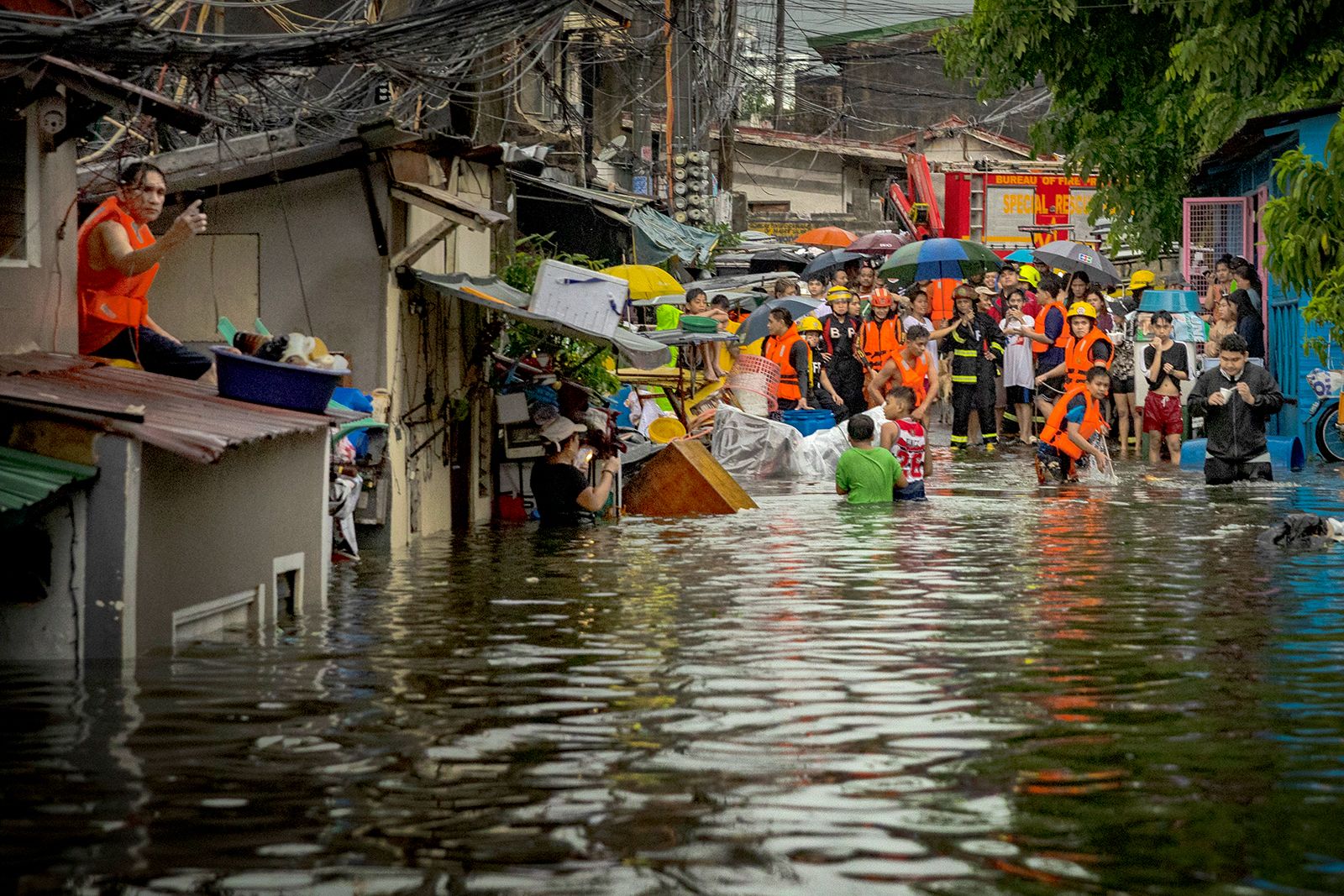Philippines Faces Year-Round Flooding: A Town’s Struggle for Survival

Crissa Tolentino, a public school teacher from Apalit, Philippines, has grown accustomed to navigating her daily life through flooded streets. This year, however, an intense monsoon season has exacerbated the flooding, leading to widespread frustration among residents. Many are questioning the government’s handling of flood control projects, alleging corruption and mismanagement of public funds. As the situation worsens, public outrage is spilling over into social media and planned protests, highlighting a growing demand for accountability from officials.
Daily Struggles Amidst Flooding
Crissa Tolentino, 36, relies on a paddle boat to traverse the inundated streets of her town, a routine she has accepted as part of life in a low-lying area near Manila. The floods have become so frequent that she only experiences dry streets for about two months each year. This year, however, the severity of the monsoon has left her feeling betrayed. “I work hard, I don’t spend too much, and taxes are deducted from my salary every month,” she expressed. “Then I learn that billions in our taxes are being enjoyed by corrupt politicians.” Her sentiments echo a growing frustration among Filipinos who are questioning why the government has failed to effectively manage the flooding despite significant investments in infrastructure.
The recent rains have caused severe disruptions, stranding commuters and leading to health concerns, including outbreaks of leptospirosis. As the floods continue to wreak havoc, residents are increasingly vocal about their dissatisfaction with the government’s response. Many are turning to social media platforms like TikTok and Facebook to voice their anger, targeting lawmakers and construction companies accused of profiting from “ghost” projects that never materialize.
Corruption Allegations and Public Outcry
The frustration over flooding has intensified allegations of corruption within the Philippine government. President Ferdinand “Bongbong” Marcos Jr. acknowledged the ongoing challenges during a visit to a flood control dam that was found to be nonexistent. Reports indicate that up to 70% of public funds allocated for flood control may have been misappropriated. The situation has led to significant political fallout, with the House Speaker resigning amid allegations of misconduct, and the Senate leader being ousted due to illegal campaign contributions.
Public sentiment has reached a boiling point, with many Filipinos expressing their anger through creative means on social media. Videos depicting lawmakers as crocodiles, a symbol of greed, have gained traction. The public’s frustration is further fueled by the lavish lifestyles of the children of politicians and contractors, who are often referred to as “nepo babies.” These young individuals, flaunting their wealth on social media, have become targets of ridicule and resentment, with many calling for accountability from those benefiting from public funds.
Protests and Government Response
In response to the growing unrest, a significant anti-corruption protest is scheduled for September 21, coinciding with the anniversary of the declaration of martial law by Ferdinand Marcos Sr. in 1972. President Marcos Jr. is acutely aware of the potential consequences of public anger, recalling how anti-corruption protests led to his father’s ousting in 1986. Recent global events, such as protests in Indonesia and Nepal, have further underscored the power of public dissent.
In light of the escalating situation, President Marcos Jr. announced an inquiry aimed at uncovering the extent of corruption within flood control projects. He encouraged citizens to voice their grievances peacefully, acknowledging the pain caused by corrupt practices. The president’s comments reflect a recognition of the urgent need for reform and accountability in the face of widespread public discontent.
Impact on Daily Life and Future Prospects
As the floods continue to disrupt daily life, many Filipinos are adapting to the challenges posed by extreme weather and inadequate infrastructure. Some, like Rhens Rafael Galang, have turned their struggles into entrepreneurial ventures, selling innovative products designed for flooded conditions. Galang expressed his frustration over the misallocation of funds meant for flood control, emphasizing the need for honest governance.
Despite the ongoing difficulties, there remains a glimmer of hope among residents for long-term solutions to the flooding crisis. The public’s demand for accountability and transparency in government spending is growing stronger, as many Filipinos reflect on past corruption scandals that have led to significant political change. With a history of ousting leaders over corruption, the current climate suggests that the call for justice may lead to meaningful reforms in the future.
Observer Voice is the one stop site for National, International news, Sports, Editor’s Choice, Art/culture contents, Quotes and much more. We also cover historical contents. Historical contents includes World History, Indian History, and what happened today. The website also covers Entertainment across the India and World.
Follow Us on Twitter, Instagram, Facebook, & LinkedIn

